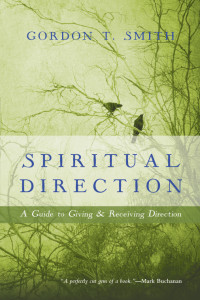 Spiritual Direction: A Guide to Giving & Receiving Direction
Spiritual Direction: A Guide to Giving & Receiving Direction
By Gordon T. Smith
My rating: 4 of 5 stars
Many longing for a deeper awareness of the presence of God in their lives have rediscovered the special relationship known as spiritual direction. One of the needs that have existed is for a readable and concise treatment of the nature of this relationship. Gordon T. Smith has given us that account in this 96 page book packed with both a theological basis for and practical explanation of this form of spiritual friendship.
He begins by describing the agenda of this relationship as one of “directing our attention to the presence of God in our lives.” This relationship is grounded in four theological themes: the Triune person and work of God, the nature of religious experience, the particularity of each person and the church as the people of God and means of God’s grace.
The conversation in a spiritual direction relationship is a focused one where a director seeks to listen to both directee and God as the directee talks about relationships and work, key decisions, our experiences of suffering and pain, and most of all in the life of prayer.
After talking about the content of this conversation, he talks about the form it takes-how is this hour (usually a fixed time is set and typically an hour) spent? It is a conversation that begins with the directee sharing about his current life experiences, reflected upon coming into the meeting. After a time of silence the director may ask questions, and propose observations regarding how God may be present in what has been shared or how the directee may respond to this presence. After silence, the directee responds and the two may dialogue further with the director closing the time with a prayer of blessing.
Smith has a chapter on the role of direction in evangelism and how direction is a special form of friendship and its relationship to pastoral ministry. Spiritual direction is a helpful counterpoint to worship, teaching, and pastoral leadership in pastoral ministry. Spiritual direction can be instrumental in helping a person come to faith as a director helps a seeker discern how God is present. Like a friend, a spiritual director speaks with truth and freedom but at the same time never preempts one’s personal responsibility to choose.
The next two chapters focus on the qualities of both a good director and a good directee (something I’ve not seen elsewhere!). Good directors are schooled in a theology of the Spirit, have an awareness of the history of Christian spirituality, extend compassion and grace, have a capacity for “double listening” to directee and to the Spirit, and keep confidentiality. Directees approach with a desire to grow, a meekness and humility, and intentionality of preparation and response. He then concludes with a focus on the true director in this relationship, the Spirit of God.
We often oppose “spiritual” and “practical”. Smith fuses the two in an account of spiritual direction that prepares the reader engaging in or considering direction to understand the nature and practice of this formative discipline.

Thank-you to Bob for sharing Review: Spiritual Direction: A Guide to Giving & Receiving Direction from his blog Bob on Books. If you have not explored spiritual direction, I encourage you to do such in the new year. God spoke to me powerfully as I engaged in prayer and Scripture study guided by a spiritual director during a very difficult time in my life over a decade ago. I confess having recently taken a break while engaged in a Masters of Arts in Spiritual Formation (Evangelical Theological Seminary), but I consider this a new year resolution to re-engage.
One caution to note in choosing a director: the process requires discernment. I have done such based on a recommendation and an initial interview/session focused upon the importance of drawing from the Word of God. I am sure that Gordon Smith, president and professor of systematic and spiritual theology at Ambrose University College and Seminary in Calgary, Alberta, addresses this concern. I am hoping to have the opportunity to read this book in 2015. Note: As you may remember Mike offered Smith’s Courage and Calling: Embracing Your God-Given Potential (InterVarsity Press, 2011) in Best Books on Calling and Vocation? ~ Thomas B. Grosh IV, Associate Director, Emerging Scholars Network
Bob Trube is Associate Director of Faculty Ministry and Director of the Emerging Scholars Network. He blogs on books regularly at bobonbooks.com. He resides in Columbus, Ohio, with Marilyn and enjoys reading, gardening, choral singing, and plein air painting.

Thank you for this review. How does one find a spiritual director? I know Catholic churches often have this, but that may or may not fit well with Protestants. When I google “Spiritual Director” in my area, I get a lot of Eastern/New Age hits.